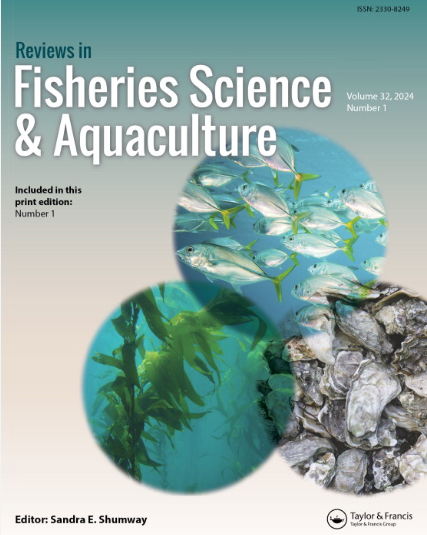Creel Surveys for Social-Ecological-Systems Focused Fisheries Management
IF 6.4
1区 农林科学
Q1 FISHERIES
引用次数: 6
Abstract
Abstract Recreational fisheries are social-ecological systems (SES), and knowledge of human dimensions coupled with ecology are critically needed to understand their system dynamics. Creel surveys, which typically occur in-person and on-site, serve as an important tool for informing fisheries management. Recreational fisheries creel data have the potential to inform large-scale understanding of social and ecological dynamics, but applications are currently limited by a disconnect between the questions posed by social-ecological researchers and the methods in which surveys are conducted. Although innovative use of existing data can increase understanding of recreational fisheries as SES, creel surveys should also adapt to changing information needs. These opportunities include using the specific temporal and spatial scope of creel survey data, integrating these data with alternative data sources, and increasing human dimensions understanding. This review provides recommendations for adapting survey design, implementation, and analysis for SES-focused fisheries management. These recommendations are: (1) increasing human dimensions knowledge; (2) standardization of surveys and data; (3) increasing tools and training available to fisheries scientists; and (4) increasing accessibility and availability of data. Incorporation of human dimensions information into creel surveys will increase the ability of fisheries management to regulate these important systems from an integrated SES standpoint.以社会生态系统为重点的渔业管理的克里尔调查
摘要休闲渔业是社会生态系统(SES),迫切需要人类维度与生态学相结合的知识来理解其系统动力学。克里尔调查通常是亲自和现场进行的,是为渔业管理提供信息的重要工具。休闲渔业溪流数据有可能为大规模了解社会和生态动态提供信息,但由于社会生态研究人员提出的问题与调查方法之间的脱节,目前应用受到限制。尽管创新地使用现有数据可以提高对休闲渔业作为SES的理解,但溪架调查也应适应不断变化的信息需求。这些机会包括使用筒子调查数据的特定时间和空间范围,将这些数据与其他数据源相结合,以及提高对人的维度的理解。本审查为调整以SES为重点的渔业管理的调查设计、实施和分析提供了建议。这些建议是:(1)增加人的维度知识;(2) 调查和数据的标准化;(3) 增加渔业科学家可获得的工具和培训;以及(4)增加数据的可访问性和可用性。将人的维度信息纳入溪流调查将提高渔业管理从综合SES角度监管这些重要系统的能力。
本文章由计算机程序翻译,如有差异,请以英文原文为准。
求助全文
约1分钟内获得全文
求助全文
来源期刊

Reviews in Fisheries Science & Aquaculture
FISHERIES-
CiteScore
25.20
自引率
0.90%
发文量
19
期刊介绍:
Reviews in Fisheries Science & Aquaculture provides an important forum for the publication of up-to-date reviews covering a broad range of subject areas including management, aquaculture, taxonomy, behavior, stock identification, genetics, nutrition, and physiology. Issues concerning finfish and aquatic invertebrates prized for their economic or recreational importance, their value as indicators of environmental health, or their natural beauty are addressed. An important resource that keeps you apprised of the latest changes in the field, each issue of Reviews in Fisheries Science & Aquaculture presents useful information to fisheries and aquaculture scientists in academia, state and federal natural resources agencies, and the private sector.
 求助内容:
求助内容: 应助结果提醒方式:
应助结果提醒方式:


